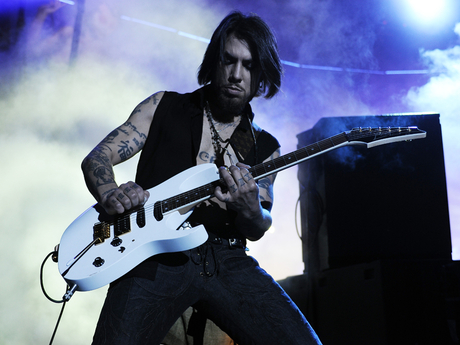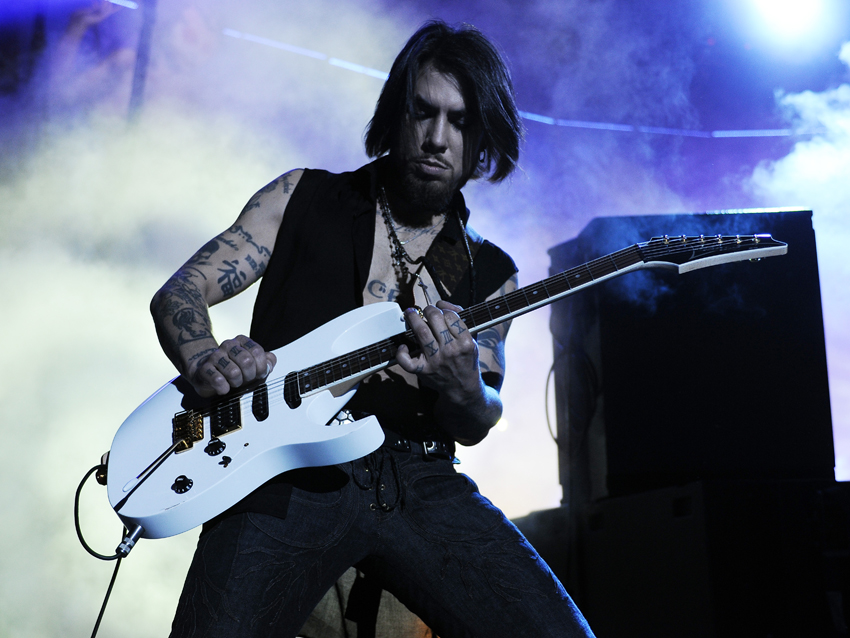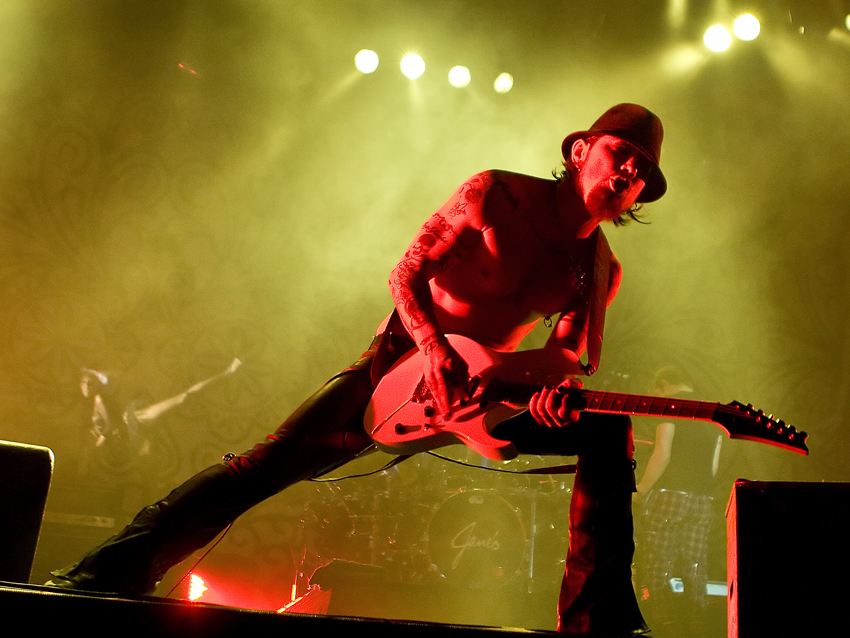

Dave Navarro on stage with Jane's Addiction in New Orleans, 2009. © Andrew Goetz/Corbis
During the past year, Jane's Addiction have seen founding bassist Eric Avery, always something of an erratic presence, turn in his walking papers yet again. Within months of Avery's split, ex-Guns N' Roses and current Velvet Revolver bassist Duff McKagan joined the fold. And for a time, all seemed hunky-dory.
Six months later, however, Duff up and quit, leaving behind many unanswered questions, the biggest of which being, quite simply, When the band finally tours behind their upcoming album (tentatively titled The Great Escape Artist), who will be playing bass?
"That's really hard to say," says guitarist Dave Navarro. "Up, down, over and around - that's pretty much how life is anyway. Why should a band be any different? And you know what? Up and down and over and around is fine when it's about something that's as much a gift as being a part of this band has been for so long."
Since late last year, the core Jane's trio - Navarro, singer Perry Farrell and drummer Stephen Perkins - have hunkered down in the studio with producer Rich Costey (Muse, Interpol) and TV On The Radio's Dave Sitek, who is playing bass and writing with the band but is not, as Navarro stresses during our interview, joining the group on any kind of full-time basis. "We've got some really great people working with us," he says, "and the vibe remains very positive."
Before heading to a recording session on a recent afternoon, Dave Navarro spoke to MusicRadar about the current (and future) state of Jane's Addiction and his thoughts on Duff McKagan's brief tenure in the group. In addition, he offered some sage advice to young musicians looking to walk in his footsteps.
Even though things are "up, down, over and around," I imagine you wouldn't mind a bit more stability in the band.
Want all the hottest music and gear news, reviews, deals, features and more, direct to your inbox? Sign up here.
[laughs] "Well, my sense of stability has always been intact. I think we've dealt with some unstable relationships in the past, but Perry, Perkins and I are pretty locked into doing this. In fact, I would probably go so far as to say that the three of us have never been this stable in terms of our personal relationships. And we've been doing this for so long that with darkness comes the light. So to focus on things that don't go the way you intended, well, usually there are opportunities for things to go in ways that you didn't expect."
I totally understand. But the bumps in the road that you have encountered, are those the things that have brought the three of you closer?
"Ultimately, I think it's a combination of a lot of things: some of the victories we've shared; some of the bumps in the road, for sure; the fact that we've known one another for so long and have worked with each other within different contexts and lineup over three decades. You just kind of take a breath and go, 'OK, these are volatile relationships.' To expect that they won't be volatile at times would, I think, be completely unrealistic."
Frankly, I was a little surprised when Duff joined the band. Not that he was a bad fit; I just didn't see him as the logical choice. How did he hook up with you guys in the first place?
"I'm not entirely certain as to the exact timeline of how that happened. Ultimately, for me to answer that question would be to try to relay a conversation that he had with Perry. The fact of the matter is, on a lot of levels, we were looking at a lot of the elements that were right. We've been longtime friends, we've played together in a lot of the same scenarios, we're from the same time, the same city, the same scene to a degree… Those elements were, in fact, in alignment. To be honest, we as a band are happy to cast our net in different directions. So we didn't know what to expect, either."
I spoke with Slash last year, who suggested that he didn't think it was Duff's plan to remain in Jane's Addiction. Were you under the impression that Duff's commitment was total? You have to admit, the situation is a little confusing.
"You know, I can't sit and answer to everybody's confusion. Put it this way: Duff was a great guy to come in and work with us and write with us and tour with us a little bit. In a lot of ways, whether he stayed in the band for 10 years or five minutes, he kept us in the direction of being productive. At the end of the day, that's really all I can ask for. As far as people being confused, I don't really know what to say. Take a walk in my shoes if you want to talk about confusion." [laughs]
I hear you. For the time that he was in the band, writing-wise and playing wise, what did Duff contribute? And how did he shape what you do as a player?
"To be honest with you, I don't really think that talking about a guy who was in my band and isn't in my band anymore, and who was only there for a short period of time, is really relevant to what we're doing now. I just don't want to go back over all that stuff, you know what I mean?"
Well, let's talk about moving forward. Now you're working with Dave Sitek from TV On The Radio -
"Yes, and I just want to clarify something with you, because I think a press release came out that read as though he's a member of the band. He's not. You probably know that already, but I think a lot of people interpreted that to mean that he's the new bass player for Jane's Addiction. Nothing could be further from the truth. He's very much in TV On The Radio, and they're mixing a new record right now, so we can look forward to that. Dave has been co-producing with Rich Costey, and he's been a pivotal part of the writing process for these sessions. He's an amazing person to work with."
So I guess the important question is, How can I join?
"You can't." [laughs]
I can't?! No audition, no demo tape, no nothing?
"Nope. Sorry, man. But that stand-up comedy routine of yours, you've got that to fall back on."
Yeah, there's always that. So what is the plan for a new bassist, or is there one yet?
"We don't really have a plan. We're not touring. As far as the studio goes, we're recording, so the bass playing duties are kind of being split between Dave and myself. We're still very much deep in the writing process, so first things first. Which is why I wanted to talk to you, but on the other hand, I don't know any more I can add to what's already been reported."
I definitely understand, and I can appreciate the delicate matter of the situation.
"I can see how it would appear that way, but it's not really all that delicate. There's not much more concrete things I can tell you. I can't tell you song titles, I can't tell you who's going to play bass, I can't tell you the plan or what we expect. Over the years, I've learned that the best thing I can do is worry about the task at hand in terms of this band, and right now, that's just going in and trying to be creative with these guys.
"As far as things being delicate, Duff and I are still cool. We play in Camp Freddy from time to time… I have no ill will. He was a great guy to come in and keep us on the right track, and I'm happy about that. I really enjoyed playing with him. He's a good dude."
As far as your own songwriting and playing with Jane's, how have you seen it evolving?
"As a guitar player, my approach has become more melodic and simplistic. I'm not doing tons and tons of overdriven rhythm guitar tracks, and not a whole hell of lot of soling that doesn't add to the melodic nature of a track. I've really been enjoying exploring different guitar textures in the studio.
"Songwriting-wise, it's always been a track-by-track thing. We've never written any two songs in the same way. That remains to be fresh, which is nice. We are utilizing other instrumentation and new technologies, but our mental approach has remained wide open."
Being that it's a "track-by-track thing," how many songs have you been contributing to as a writer?
"I couldn't even begin to answer that. There's so many things, and we haven't even decided on a tracklist yet. I would say that there's a lot of material to go through, and the three of us - or the four of us - have been very… See, where an initial seed for a song comes from varies, and we all work off of one another. Everything, though, takes us from point A to point B."
I'm just trying to get a handle on this. How much of the album is actually recorded at this point?
"Again, I'm not sure. We've been demoing stuff in the studio on the day that we write a track, but we haven't gone to Phase 2, so it's hard to say what we're going to keep. But we're definitely in the homestretch. There might be drums on one track that we want to redo the bass on, or there may be a great vocal performance on another track but the bass and guitars are unusable, you know what I mean? It's kind of all over the place. In some ways, we could be a lot closer than I think, and in a lot of ways, we could be further than I think."
Are you eyeballing a summer release?
"Mmm, I leave those things to the suits. My job, more or less, is to go in and play. Like I said before, focusing on elements of the band that are not in the here and now are pretty pointless. And I apply that way of thinking to my everyday life, as well. Trying to predict the future, nine times out of 10, I'm usually wrong. So I've kind of stopped doing that."
Talk to me about working with Rich Costey. What's he brought to the new record?

Navarro rocking Santa Barbara, California in 2009. © Erik Ward/Retna Ltd./Corbis
"Rich is great. I worked with him on my solo album [Trust No One, 2001], and we have a long-standing, close relationship. I really trust his instincts and his ears. If I didn't know better, I'd say he was from The Pleiades. [laughs] He may, in fact, be some kind of reptilian that has not yet been discovered."
Did you bring him into the project?
"No. You know, as with any project, when a band gets together, you look at a list of producers and you talk about who you might want to work with, and as it turned out, we all really gelled with Rich. The communication between all of us was there immediately. If I was to do another solo record, I'd definitely want to work with him. In the context of this band, however, you have a few different strong, unique personalities who all deserve their own unique approach, and as it turned out, the decision was made to work with Rich, and I couldn't be happier."
As you can imagine, a lot is riding on this next album. Does the weight of expectation get to you at all?
"I'm not really aware of what the expectation is. I don't know where that comes from. On any project, I've never been concerned about that. But you know…to tell you the truth, I'm glad to know that there's any expectation. Let's remember, we've been at this a lot of years."
What are your thoughts on the record business these days? What with downloading and all, so much has changed since the time you guys started out.
"I would say that, by and large, the sense that I have is that there are a lot of great artists out there that aren't really getting a shot. It seems that most of the labels are looking for the sure-fire moneymaker, and they aren't concerned with the art or the craft or the expression. They're looking for their three-minute single with the cute package. That's sad. I know that when we were coming up, we were allowed all the flexibility in the world. We still are, and we're very grateful for that. In the whole time since we've started this record, I haven't seen or heard from one label person - that's a good sign! [laughs]
"On the subject of downloading, it's a blessing and a curse. A lot of music gets out there and artists get heard, but at the same time a lot of things get lost because there's so much information overload. As a result, a lot of artists don't get things like tour support; they don't get a chance to build a following. There's a lot of scrambling."
See, you guys are in a different place than new, emerging acts. Even though you might lose album sales to downloading, you already have an audience and can readily tour.
"That's a big point, because when we got started, we got tour support, and we were able to hone a live show. We were able to find out who we were as a band. Groups can't do that nowadays. I can't tell you how many times I hear guys in bands talk about their first single - 'It's going up on iTunes' or whatever - and I know that if it doesn't take off right away, they're on their own. I find that very frustrating. So yeah, I'm very glad that we got together when we did, and we had the chances that we've had. That's not to say that the window isn't narrower than it used to be, because it is."
Hypothetical question: You're talking to a young Dave Navarro in 2011. What kind of advice would you give him about the music business?
"I'll just tell you what I did. When I first picked up the guitar and got into playing and got into my first bands in high school, that was before MTV, before the internet, before all kinds of things. Anything that happened was through word of mouth and radio. I was totally unaware of the 'rewards' of this business. Not to sound naïve, but I wasn't aware of things like fame and money and cars and girls. I heard Jimi Hendrix through a loudspeaker in a skate park, and I asked somebody who it was, and when he told me, I went out and bought one of Jimi's records. That's what I did.
"I literally found my own way through the process of making music. Basically, that's all it comes down to. For both me and the band, you have to forget all about expectations and wanting things and just be about making music and creating. So that's the advice I would give to a young person: focus on the craft and the enjoyment of the art. You have to get out of this 'When I become famous, everything will fix me' kind of mindset. That's a very dangerous trap to fall into. Make sure you love what you're doing, and the chips will fall where they may."
Joe is a freelance journalist who has, over the past few decades, interviewed hundreds of guitarists for Guitar World, Guitar Player, MusicRadar and Classic Rock. He is also a former editor of Guitar World, contributing writer for Guitar Aficionado and VP of A&R for Island Records. He’s an enthusiastic guitarist, but he’s nowhere near the likes of the people he interviews. Surprisingly, his skills are more suited to the drums. If you need a drummer for your Beatles tribute band, look him up.
